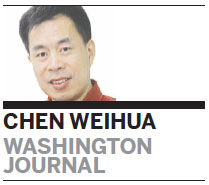When US Secretary of Defense Chuck Hagel visits China from April 7-10, both sides will find things for celebration and concern.
It will be Hagel's first trip to China since leading the Pentagon on Feb 27, 2013. The visit was listed in the outcome document of the 5th China-US Strategic and Economic Dialogue held in Washington last July. In front of the visiting Chinese Defense Minister Chang Wanquan last August, Hagel told the press that he enthusiastically accepted the invitation.
Besides meeting his Chinese counterpart and other Chinese government and military leaders, Hagel will visit People's Liberation Army (PLA) troops and academy.
Hagel's visit, which will also take him to Japan and Mongolia, comes at a time when the US and China have witnessed increasing military exchanges, which were emphasized by Chinese President Xi Jinping and US President Barack Obama when they met at the Sunnylands estate in California last June for an informal summit aimed at building a new type of major country relationship.
In July, the PLA Navy will for the first time participate in the 23-nation Rim of Pacific (RIMPAC) naval exercises hosted by the US, a move regarded as significant in bilateral military exchanges.

In February, PLA soldiers also for the first time joined the annual multilateral Cobra Gold drills held in Thailand, led by the US and Thailand.
In the past, US and Chinese militaries had only engaged in bilateral and multilateral humanitarian assistance, disaster relief and anti-piracy drills in Hawaii, Southeast Asia and off Somalia.
Besides drills, high-level visits are on the rise.
US Army Chief of Staff General Raymond Odierno went to China in February, following trips there last September by US Air Force Chief of Staff General Mark Welsh III and last April by Martin Dempsey, chairman of the Joint Chiefs of Staff. And Chief of Naval Operations Jonathan Greenert is expected to visit China this year.
On the Chinese side, Chief of the General Staff of PLA Fang Fenghui will come to the US this year. Last September, PLA Navy Commander-in-Chief Wu Shengli toured the US.
Despite the growing cooperation and exchanges, competition is still rife in the military arena.
Hagel said last Friday the US does not seek to militarize cyberspace and the US will exercise restraint. "We are urging other nations to do the same," Hagel told an audience at Fort Meade, headquarters of the US Cyber Command and National Security Agency.
China's Foreign Ministry spokesman Hong Lei responded on Monday by saying that China hopes the US can translate relevant remarks into concrete policies and actions and work together with the international community to build a peaceful, secure, open and cooperative cyber space.
The US has been marred by reports of spying on its own people and other nations, according to revelations by former NSA contractor Edward Snowden.
The NSA has hacked into the servers of China's telecom giant Huawei to obtain all kinds of information such as regarding Chinese leaders, banks and other activities, according to the latest Snowden revelation published by the New York Times and German weekly Der Spiegel about two weeks ago.
While North Korea, Iran and Ukraine are the likely topics for Hagel in China, tensions in both the South and East China Seas will also be among the focus.
Tension has been high between China and Japan over the Diaoyu Islands in the East China Sea since the Japanese government nationalized the islands in late 2012. China has denounced the latest provocation by the Philippines in the Ren'ai Reef in the South China Sea.

Peter Hays Gries, chair and director of the Institute for US-China Issues, believes the most likely scenario leading to a US-China conflict will not be an issue between the two sides, but, rather, due to a third party, such as Japan and the Philippines, which have territorial disputes with China, and the US is obligated to come to their defense if they have a military conflict with China.
China has regarded the US as biased toward its allies on issues in the South and East China seas. It also expressed deep disappointment at the US arms sales to Taiwan, its military surveillance off China's coast and certain US laws that restrict US-China military exchanges.
Contact the writer at chenweihua@chinadailyusa.com
